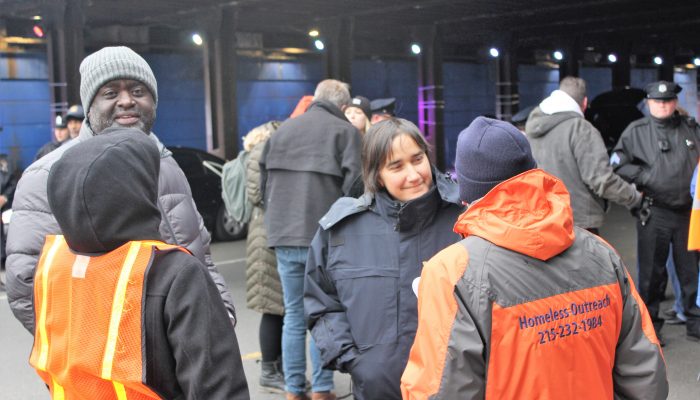The Philadelphia Resilience Project is the Kenney Administration’s interagency, unified approach to helping neighborhoods and people affected by opioid-driven homelessness.
A critical piece of the project involves closing encampments. In the Kensington area in particular, four large encampments formed involving open drug use, overdoses, criminal activity, and conditions that jeopardized the health of both those living in the encampments and neighborhood residents.
On January 31, 2019, the City closed the last of these four large encampments.
The City focuses on compassionate, effective solutions.
Clearing encampments away with force and little else, as other cities have done, does not work.
People simply move to another area that’s frequently more isolated, leading to even more dangerous situations and overdose deaths. It also creates distrust between the government and the very people we are trying to help. Plus, it never addresses the root cause of the problem.
Philadelphia approached the issue differently as part of an encampment pilot program. We established a list of people living there, not by number but instead by name. In fact, we found that those in the encampments wanted to be known, to be seen. This also allowed us to coordinate services — like housing, healthcare, and treatment — in a more effective, efficient way.
Outreach teams comprised of experts, as well as people with lived experience with homelessness and substance use disorders, visited the encampments day in and day out to establish relationships with people there.
They worked hard to convince as many people as possible to accept help while still respecting their agency as human beings.
The City uses a specific process with a deadline, services, and options to store belongings.
When the City identified which encampments existed and had to be closed, it communicated about the closure at least 30 days beforehand. Outreach workers regularly and repeatedly explained what would happen and when. The City also posted bright orange notices in English and Spanish all around the encampment with the same information.
In the 30 days before the closure date, outreach also continued to convince as many people as possible to accept assistance. Since spring 2018 when the encampment pilot started, two thirds of all people we’ve interacted with have accepted some form of help, whether it’s housing or drug or mental health treatment.
On the closure dates, dozens of City workers, including outreach teams, visited the encampments to try to get anyone still there to accept help. They also brought along storage containers, offering to store, at no cost, any belongings that weren’t a danger to health or safety.
After that, City officials cleared away anything left behind, including hazardous materials like used syringes, and treated the area for public health and safety reasons.
The City has help available for anyone who wants it.
Given the extraordinary circumstances involving the encampments, along with the unique problems faced by those living in them, the City worked hard to ensure that help is available for anyone who lived there.
In fact, there are beds and slots available in treatment programs and shelters across Philadelphia for anyone who wants help.
Since the encampment pilot started, 65 percent of all people have accepted some form of assistance. In some cases, people who spent time in the encampments were not homeless and did have places to go.
It’s important to note that when the City closed the last encampment on January 31, 2019, the temperature was in the single digits and the wind chill was below zero. Despite these dangerously cold conditions, about 45 people still remained at the last encampment the morning it was closed. 35 of them accepted some form of help.
Closing the encampments is just the beginning.
While closing the four large encampments is extremely important and necessary, both to save lives and improve and maintain quality-of-life in the surrounding neighborhood, it’s not the end of the City’s work to fight the opioid epidemic.
The City is working hard to prevent any new encampments from forming and considers, and will work to keep, the Kensington encampments permanently closed. Philadelphians should immediately report any new encampments in any location or suspected encampments by dialing 3-1-1. The City’s 311 service has staff dedicated to the Philadelphia Resilience Project who can help.
Likewise, we’ll continue to develop strategies and offer help — including low barrier housing, pathways to recovery and employment, healthcare, and mental health or drug treatment — for as long is necessary to save lives and fight the opioid epidemic.


